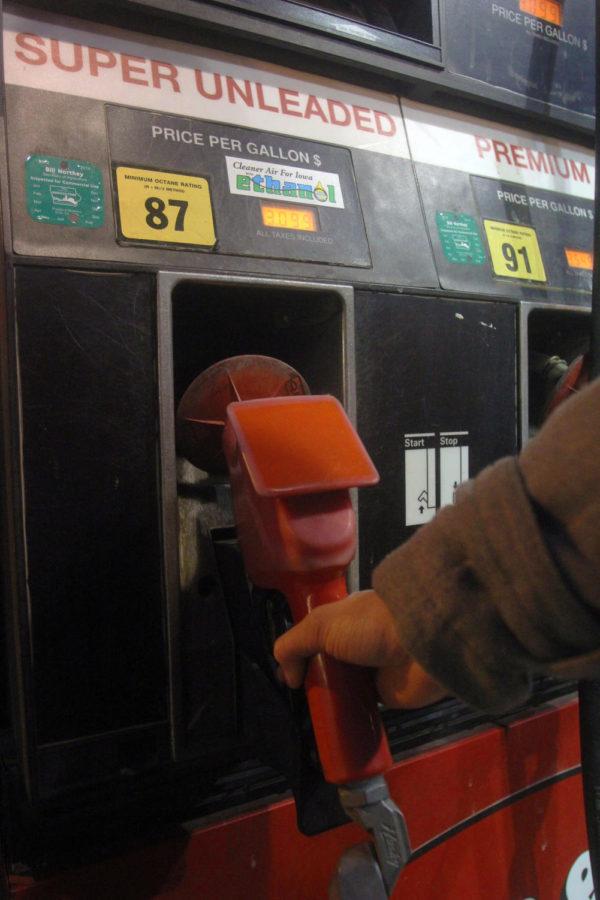Iowa Legislature asks to rollback proposed EPA mandate
The governor recently opposed the new renewable fuel standard by the EPA, which could affect demand for ethanol and ultimately corn in Iowa. Students like Nico Lambert, a junior in interior design, still use ethanol for its lower price.
January 22, 2014
The Iowa House and Senate approved a resolution last week calling on the federal government to abandon a proposal which would lower the required amount of renewable fuels used in transportation fuels.
Legislators supported the Renewable Fuel Standard (RFS), administered by the Environmental Protection Agency which mandates the minimum amount of renewable fuel used in transportation fuels. A proposed rule change for 2014 would cap the required amount of renewable fuel to be blended at 15.52 billion gallons, about a billion gallons lower than the 2013 mandate.
The rule was proposed on the backdrop of stagnant fuel consumption, projected production of gasoline and a slow economy. The “total liquid fuels” consumption is projected to be flat in 2014 by the U.S. Energy Information Administration.
“What it really does is stymie investment in the next generation of ethanol production, things like cellulosic ethanol, ethanol from algae … We need the first step to get to the next generation,” said T.J. Page, spokesperson for the Iowa Renewable Fuels Association. There are a few cellulosic ethanol plants in Iowa which use corn stover, grass, etc. to derive ethanol.
Page said that the mandate would affect job creation and environmental benefit with higher greenhouse emissions.
“[The mandate] has got us backwards on this law and we need to return to its original intent which is to increase energy security, reduce our greenhouse gas emissions as well as spur American investment,” said Page.
Page said oil lobbying groups have pressured to have the “blend wall” in place which restricts the the portion of ethanol in gasoline, even though fuel with more ethanol can be used to run newer vehicles.
The non-binding resolution was passed unanimously. Groups advocating for renewable fuel have opposed the lower mandate. Since their inception in 2005, RFS mandates have been helpful to corn and ethanol producers. The lower mandate would translate to less production of ethanol, which is derived from starch crops such as corn.
The ethanol blends commonly used are E-10 and E-85 referring to the amount of ethanol used in the fuel. A recent paper by professor Bruce Babcock and assistant professor Sebastien Pouliot from the Center for Agricultural and Rural Development at Iowa State suggested increasing distribution of the E-85 fuel to make it feasible.
Most of the cars use E-10 fuel with 10 percent ethanol. E-85 fuel uses no more than 83 percent ethanol. However, E-85 is not widely distributed with just about 2,500 gas stations found mostly in the Midwest. Both these blends are known to give lower mileage due to their lower energy content.
“The mandate was lower than it was supposed to be for 2014 … The claim they make is that the economy is not able to accept the extra ethanol. That caused a lot of stir with the ethanol industry and farmers,” Pouliot said.
Pouliot said that the mandate would not have an effect when the corn prices are low.
“If corn is cheap, they’ll use corn to produce ethanol. Blenders will also use as much ethanol in E-10 as possible,” Pouliot said.
He added that it is necessary to increase the mandate and thereby create an incentive for gasoline producers to create more E-85 fuel distribution centers. Ethanol mandates have so far helped Iowa farmers with higher corn prices.
Despite the growth, Pouliot pointed out other effects of the growth such as more farmland used for corn, increased use of fertilizers and higher food prices due to increased demand for corn.
An Associated Press story published last year brought attention to the environmental effects of increased acreage of corn for ethanol production. Referring to the story, Page added that a few bad actors will continue with bad practices regardless of the profit. He said that farmers in Iowa realize the worth of their land and work hard to preserve it.
The EPA is taking public comments on the proposed mandate until Jan. 28.

















